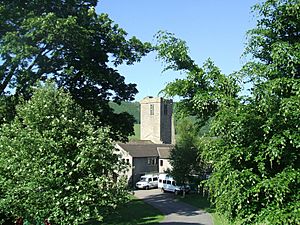Marrick Priory facts for kids
Marrick Priory was once a special home for Benedictine nuns in North Yorkshire, England. It was built a long, long time ago, between the years 1140 and 1160, by a person named Roger de Aske. The priory also owned a church, called the Church of the Virgin Mary and St. Andrew, and about 400 acres of land nearby. It was a busy and important place until the 1500s, even though it sometimes faced attacks from Scottish raiders.
Contents
The Priory's History
Life as a Nunnery
For many centuries, Marrick Priory was a peaceful place where nuns lived, prayed, and worked. They followed the rules of the Benedictine order, dedicating their lives to God and their community. The priory was a central part of life for people in the local area.
The End of the Nunnery
In 1539, a big change happened across England. King Henry VIII decided to close down many monasteries and priories, including Marrick Priory. This event is known as the Dissolution of the Monasteries. On September 15, 1539, the head nun, Christabel Cowper, gave up the priory to the King's officials.
All sixteen nuns who lived there had to leave their home. The prioress received a small payment of 100 shillings each year, and the other nuns received smaller amounts. After the nuns left, the King's government rented out the priory land.
New Owners
Later, in 1545, a man named Sir John Uvedale bought the priory site for £364. He then sold it in 1592 to Sir Timothy Hutton. In 1633, the Blackburn family bought it.
The church building at Marrick Priory continued to be used by local people for their worship until 1948. After that, it was used as a farm building for a while. Today, it is recognized as a very important historical building, known as a grade II* listed building.
Marrick Priory Today
An Outdoor Adventure Centre
In 1970, after being carefully repaired and restored, the old church building got a new life! It was turned into an exciting outdoor education and residential centre for young people.
Today, Marrick Priory is a place where thousands of young people each year can try out many fun and challenging activities. These include:
- Rock climbing
- Abseiling (climbing down ropes)
- Canoeing and kayaking on the water
- Exploring caves (caving)
- Navigating obstacle courses (ropes course)
- Riding a zip wire
- Finding their way with maps (orienteering)
- Working together in team-building games
It's a fantastic place for kids to learn new skills and enjoy the outdoors!
The Nuns' Steps
Near the priory, there's an old stone path called the Nuns' Steps or Nuns' Causey (which means causeway). This path goes through a wooded area called Steps Wood and leads to the village of Marrick. People believe this path was used by the nuns of the priory. It might have connected them to a main road or to places where they had lead-mining interests long ago.
 | Victor J. Glover |
 | Yvonne Cagle |
 | Jeanette Epps |
 | Bernard A. Harris Jr. |


